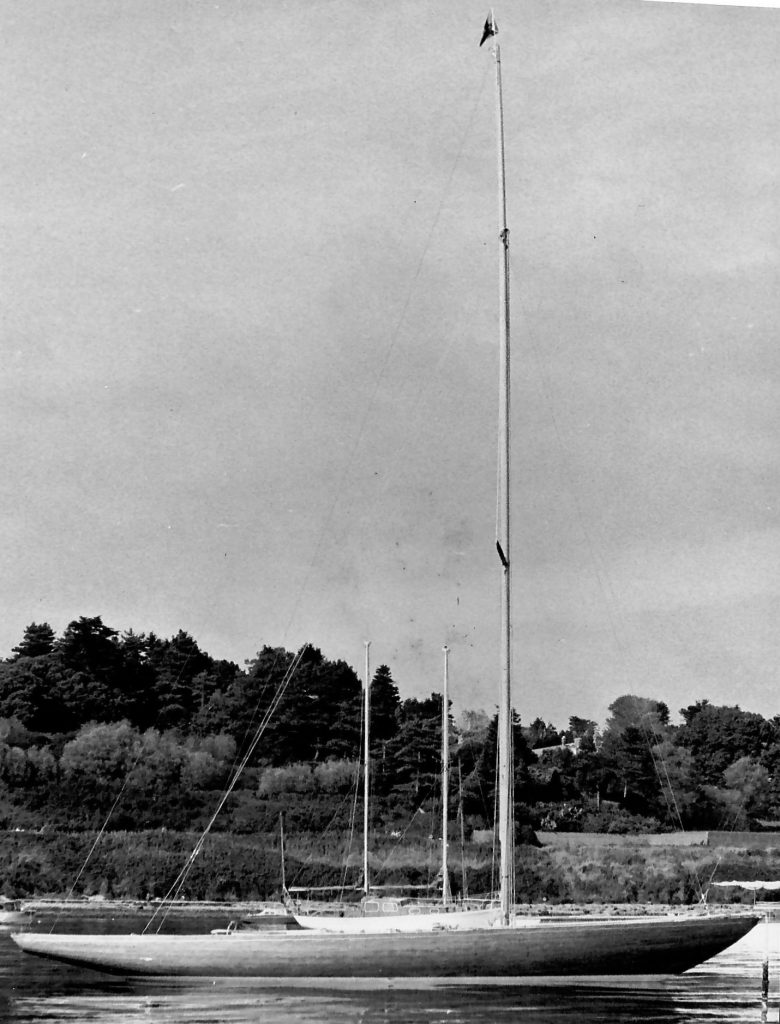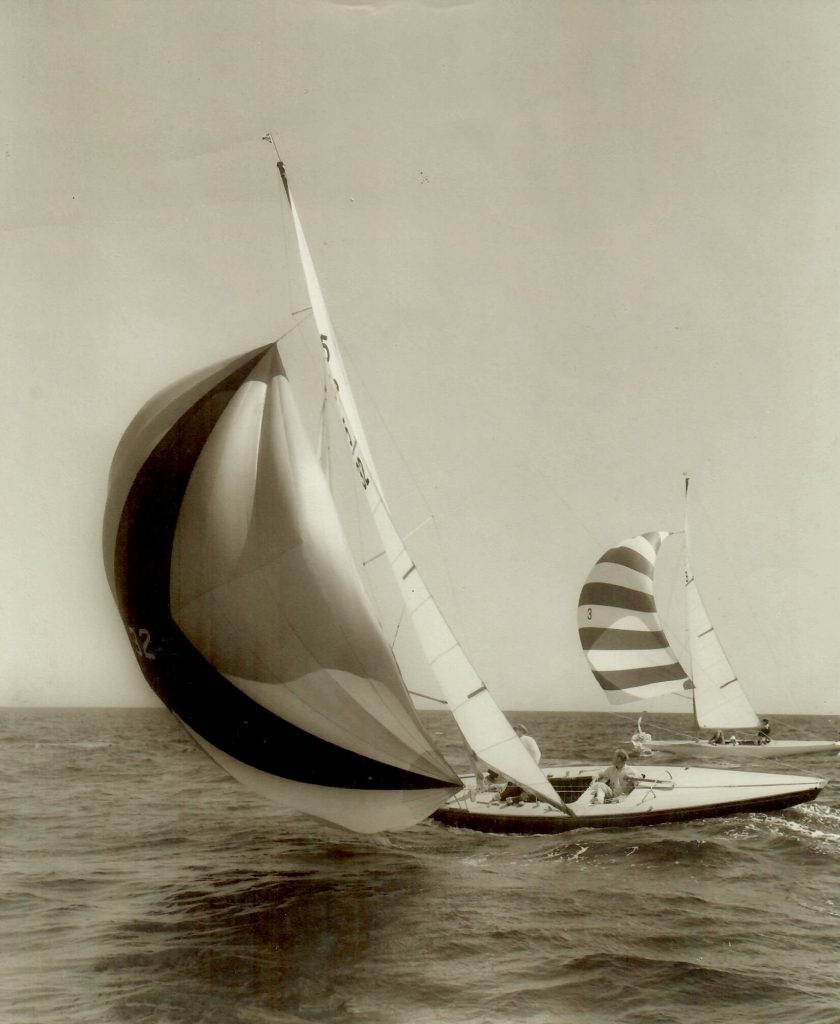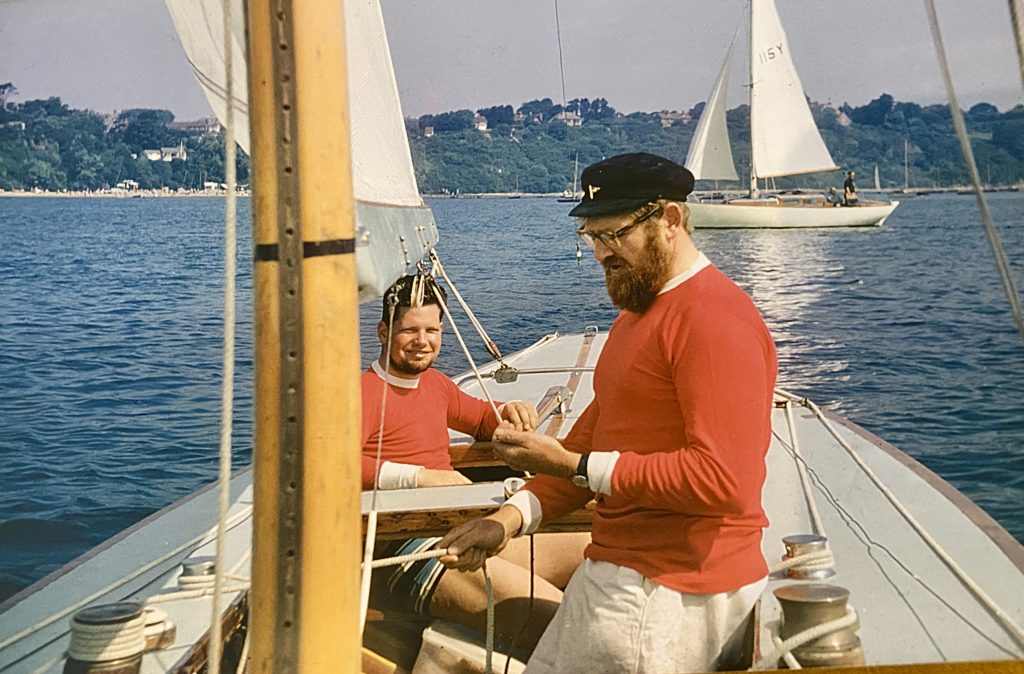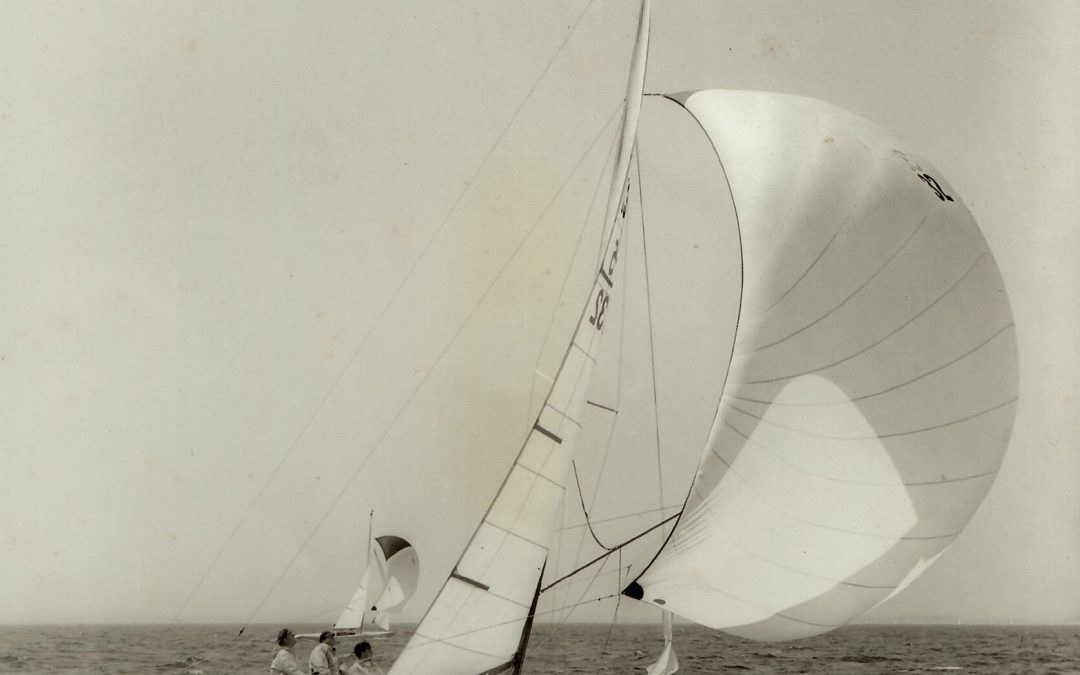Blue seas, sunlit islands fringed by the creaming surf is the sort of dream one has going cruising in a small sailboat. This is not quite what one gets in the English Channel. Still more of that later.
My friend Arthur Meech is the proud owner of a 5.5 metre yacht called Bjarne, which was the runner up in the British Olympic trials in 1963. She is a first-class racing boat with no aspirations for cruising whatsoever. The decision to take her cruising came after having drunk a rather high bottle of wine celebrating our initial racing success of the season. The first day of our holiday coincided with a break in the foul weather of last summer. The shipping forecast reported a high-pressure area in mid Atlantic which made a change from the constant stream of depressions which had been attacking Britain. The locals all shook their heads wisely and said how foolish we were to cross the channel in an open boat, but after having boasted that we were going to do it, it would have been harder to back down than to go.
After a morning of loading the ship’s stores aboard we set sail from Castle Cove, Weymouth with a gentle South West wind at lunchtime on Sunday. Conditions were so good that instead of going to Cherbourg we decided instead to go for the big haul to Brittany. The rest of the day we sailed slowly out into the channel, always in view of the dreaded Portland bill until just before sunset, the wind died on us. Then one of our better ideas was tried – a hot toddy. This was a big tot of whiskey, three spoons of sugar and boiling water. It became part of a regular tradition from then on. Even boiling water was quite a job. We had a small gas camping stove which was wedged between one’s feet and the idea was to try and get the kettle somewhere in the proximity of the flame.
During the night the breeze returned, and we had a lovely night sail. The Casket light, which is a lighthouse off the Channel Islands appeared exactly where our navigation reckoned it should have, at about 1:00 AM. Sleep was virtually impossible but one dozed on ones off watch for two hours. During the night we sailed through the major shipping lanes, but fortunately we did not have to alter course for any ship, although a couple came close enough to hear their engines.
The morning dawned with a marvellous sunrise. Weather forecast was still good. Our estimated time of arrival was 17:00 hours. During the day the sun was so hot that we had to cover every piece of exposed skin. At one period the whole sea came alive with little fish, what sort we never found out, but the Gannets seemed to be very busy charging their engines by eating as many as possible as fast as possible. 17:00 hours no sight of land. The log line registered 98 miles comma the first sign of uneasiness. At 20:00 hours a buoy was seen so we went to find out what it was. It was very plainly marked Goutier, so looking up our navigation books and charts we expected to know exactly where we were. After half an hour search we were no wiser of where that buoy was than before. The visibility began closing in on us, but a lighthouse appeared to the North of us, which we failed to recognise and with the tide going eastwards we left the lighthouse astern to the West. Shortly after the change of tide the wind freshened to about force 4. Time to bring off the jib sail. We raised the light of Rouche-Douvres, but could not see Lézardrieux, which should have been visible. The morning brought rain and poor visibility in the early hours. I added one more hat to the various assorted headwear I have lost in the channel, a sad blow to my morale which was getting quite low. The log read 153 miles at 08.30. We took a dead reckoning position which we thought must be in the bay of Saint Bruit, but still no sight of land, but a French fishing boat appeared out of the murk, just as she came alongside, we saw a town we thought must be Gran Legion. This was confirmed by the French boat, so we went with a free tide and a definite course to sail. We arrived at the entrance to Lézardrieux going inside the light through the race at 12:15 hours. We had a splendid sail up the River to the village where we found a convenient mooring which we picked up at 13:40 making the trip in 47 hours 40 minutes and with 178 miles on the log. We tried to explain to French customs that our boat was down the River on a buoy, but not knowing the French name for buoy we could not make them understand. Our pigeon French went like this: “vous attachez la batou dan la garcon”, never mind we had a splendid two days in port. The thing was to act as the Royal Yachting Association requested and let our family know where we were. At the post office we were informed that yesterday we could have telephoned or sent a telegram, or tomorrow, but not today, quite a quaint arrangement!
On the Thursday we took the first of the flood out of the River and laid course for Fowey, Cornwall. For the first six hours we reached across the channel for the South West when logging 6 knots and plenty of flying spray. The wind fell light as evening came and during the night, we made little progress. At 04:00 we raised the Edison lighthouse right on our bow which gave us back our faith in our navigation. The weather, crafty as ever must have seen us thinking that we never had it so good, swung to the northwest giving us a deadbeat. As we neared the land the Cornish coastline appeared to be like the moon face with the horrible white piles of the China clay industry. Could not grass or something be planted on these eye sores and restore the beauty of this once lovely coastline?
The weekend was spent with some members of Castle Cove sailing club who were team racing against the Fowey Gallants, the Fowey River one design boats. They beat us by 4 points after some exciting racing, but their hospitality was so wonderful that I think it would have been ungracious of us to have beaten them.
Little respite for Bjarne, for after the final race on Sunday we set off back for Weymouth at 17:00 hours. It was a fine sight sailing through the entrance of Fowey to see the Commodore on the edge of the Cliff waving farewell. We had a northwest about force 4 which carried us along the coast. At 20:00 hours we were off the Newstone aiming for home, but the lure of a pint at the Globe at Lostwithiel was stronger. Once again, we were fortunate and picked up a mooring by a paint barge. The Avon rubber dinghy was pumped up in record time and we made our stop worthwhile. We left the following morning at about 11:00 still with a following wind, and about 14 hours later we rounded Portland bill in the dark and attempted the inshore passage, slightly misjudged the distance from the shore, with a result that swept us through the edge of the race, which gave us a few uneasy moments and a further wetting. About half an hour later it was very pleasant to sail into Castle Cove after approximately 400 miles of sailing in an open boat. We celebrated by having a very liberal hot toddy.




Recent Comments